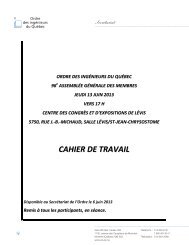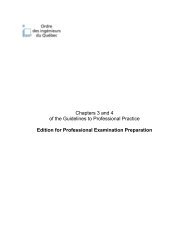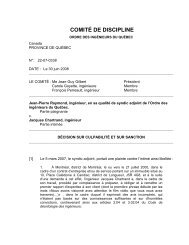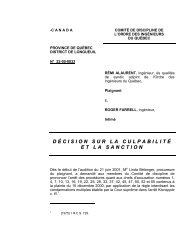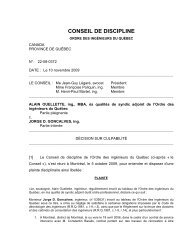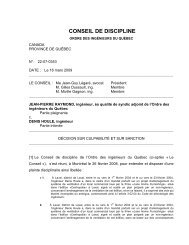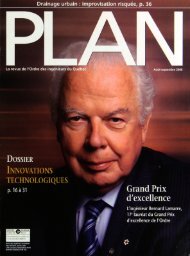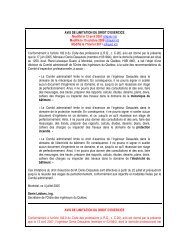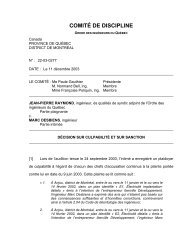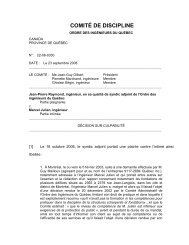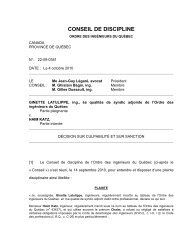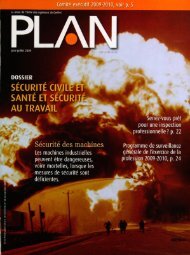PLAN 2007-6 - Ordre des ingénieurs du Québec
PLAN 2007-6 - Ordre des ingénieurs du Québec
PLAN 2007-6 - Ordre des ingénieurs du Québec
Create successful ePaper yourself
Turn your PDF publications into a flip-book with our unique Google optimized e-Paper software.
EDITORIAL<br />
INFRASTRUCTURES :<br />
REPENSER LE SYSTÈME<br />
Le mardi 31 juillet <strong>2007</strong> restera une date marquante dans la mémoire<br />
collective de l'<strong>Ordre</strong> <strong>des</strong> <strong>ingénieurs</strong> <strong>du</strong> <strong>Québec</strong>. En ce jour d'été, j'ai eu la<br />
responsabilité de présenter le mémoire de l'<strong>Ordre</strong> avec ses neuf recommandations<br />
à la Commission d'enquête sur le via<strong>du</strong>c de la Concorde (CEVC).<br />
La présentation de l'<strong>Ordre</strong> a marqué la fin <strong>des</strong> interventions aux audiences<br />
de la Commission.<br />
Ce n'était alors ni le lieu ni le moment pour l'<strong>Ordre</strong> de se prononcer<br />
sur le comportement indivi<strong>du</strong>el d'<strong>ingénieurs</strong> concernés par le dossier.<br />
Comme vous le savez, cette responsabilité relève, le cas échéant, <strong>du</strong> Bureau<br />
<strong>du</strong> syndic de l'<strong>Ordre</strong>. Grâce au statut d'intervenant que l'<strong>Ordre</strong> a demandé<br />
et obtenu, nos services ont suivi attentivement les travaux de la Commission<br />
et ont pris note <strong>des</strong> différents éléments de preuve présentés.<br />
Alors pourquoi un mémoire de l'<strong>Ordre</strong>? L'<strong>Ordre</strong> a déjà mené une<br />
réflexion sur le piètre état <strong>des</strong> infrastructures et j'ai alors signé une lettre<br />
d'opinion dans les médias (SOS infrastructures : <strong>des</strong> solutions et éditorial<br />
<strong>PLAN</strong>, mars <strong>2007</strong>, p. 7). Comme citoyen socialement responsable, l'<strong>Ordre</strong><br />
veut que les gens se sentent en sécurité lorsqu'ils utilisent <strong>des</strong> infrastructures<br />
publiques, surtout si cela relève <strong>du</strong> champ d'intervention de l'ingénieur.<br />
Chaque partie, que ce soit les gouvernements, les ministères, les municipalités,<br />
les constructeurs, les professionnels, doit se sentir concernée. Les<br />
pistes de solutions que l'<strong>Ordre</strong> propose dans son mémoire visent à éviter<br />
que de tels événements ne se repro<strong>du</strong>isent et vont donc dans le sens de<br />
l'intérêt public.<br />
Je m'arrêterai dans ces lignes à un ou deux aspects de notre mémoire.<br />
Je vous invite fortement à lire en détail la rubrique Mot d'<strong>Ordre</strong>, p. 12. Au<br />
cours <strong>des</strong> audiences de la Commission, il a souvent été question de surveillance<br />
<strong>des</strong> travaux. Une lecture attentive de notre cadre légal montre<br />
qu'aucune disposition ne prescrit la surveillance par un ingénieur <strong>des</strong><br />
travaux de construction d'ouvrages conçus par un ingénieur. C'est une anomalie,<br />
surtout lorsqu'on est en présence d'ouvrages complexes, ou critiques<br />
sur le plan de la sécurité. Nous avons bon espoir que la Commission retiendra<br />
notre recommandation quant à l'obligation de surveillance de ce genre<br />
de travaux de construction par un ingénieur. Il faut remédier à cette faille<br />
dans le système, pour la protection <strong>du</strong> public. La surveillance <strong>des</strong> travaux<br />
de construction ou d'installation par un ingénieur devenant obligatoire,<br />
l'<strong>Ordre</strong> pourrait se doter d'outils pour effectuer un contrôle, notamment<br />
sur les chantiers de construction.<br />
Reste un urgent besoin de traçabilité. L'<strong>Ordre</strong> recommande la mise en<br />
place obligatoire par les propriétaires d'infrastructures de systèmes permettant<br />
de retracer l'origine, la nature et les responsables de toute modification<br />
effectuée en cours de construction et au cours de la vie d'un ouvrage, de<br />
même que pour toute évaluation ou inspection.<br />
L'analyse globale <strong>des</strong> travaux de la Commission va également permettre<br />
à l'<strong>Ordre</strong> de bien cerner les zones d'intervention au profit de la protection<br />
<strong>du</strong> public et de l'intérêt public et pour lesquelles de nouvelles mesures ou<br />
<strong>des</strong> renforcements seront à prévoir, le cas échéant, au niveau de la pratique<br />
professionnelle.<br />
D'une manière générale, l'<strong>Ordre</strong> prône dans ses autres recommandations<br />
une gestion intégrée <strong>des</strong> infrastructures au moyen de plans<br />
d'intervention et d'investissement à long terme. L'une <strong>des</strong> principales<br />
mesures porte sur la création d'un organisme public centralisé et fort, une<br />
sorte de chien de garde, dont le mandat principal serait de s'assurer que<br />
les citoyens aient accès à <strong>des</strong> infrastructures sécuritaires et fonctionnelles.<br />
Nous aurons certainement l'occasion de reparler <strong>des</strong> infrastructures<br />
publiques, de la prise de conscience collective et <strong>du</strong> rôle que nous,<br />
<strong>ingénieurs</strong>, tenons et devons tenir. Retenons que toute crise est une occasion<br />
de changement. À nous de jouer, pour un regain de sécurité et de<br />
rigueur. C'est ce que nous devons à la société québécoise.<br />
Pour commentaires, bulletin@oiq.qc.ca.<br />
Zaki Ghavitian, ing.<br />
Président<br />
INFRASTRUCTURES:<br />
RETHINKING THE SYSTEM<br />
Tuesday, July 31, <strong>2007</strong> will remain an important date in the history of the<br />
<strong>Ordre</strong> <strong>des</strong> <strong>ingénieurs</strong> <strong>du</strong> <strong>Québec</strong>. On that summer day, it was my job to<br />
present the OIQ's brief with its nine recommendations to the commission<br />
of inquiry investigating the collapse of the Concorde Overpass. The OIQ's<br />
presentation was the last to be heard at the Commission's public hearings.<br />
Of course it was neither the time nor the place for the OIQ to express<br />
its views on the con<strong>du</strong>ct of any indivi<strong>du</strong>al engineers involved. That, as you<br />
know, is the responsibility of the Office of the Syndic of the OIQ. With the<br />
intervener status we specially requested, we were able to attentively follow<br />
the work of the Commission and take careful note of the evidence<br />
presented there.<br />
So why did the OIQ submit a brief? We have already discussed the poor<br />
state of our infrastructures and I wrote an op-ed piece (SOS infrastructures:<br />
what can we do) and an editorial that appeared on page 7 of the March<br />
<strong>2007</strong> issue of <strong>PLAN</strong>. As responsible corporate citizen, the OIQ wants people<br />
to feel safe when they use public infrastructures, especially where engineers<br />
have been involved. Every party, including the government itself, its<br />
departments, the municipalities, builders and professionals, has to recognize<br />
its implication. The solutions proposed by the OIQ in its brief are <strong>des</strong>igned<br />
to avoid the recurrence of events like the Concorde collapse and reflect<br />
the public interest.<br />
Now let me just mention one or two aspects of our brief (I urge you<br />
to read it in detail, under the heading Mot d'<strong>Ordre</strong> on p. 12). During the<br />
Commission hearings, the issue of the supervision of work came up frequently.<br />
A careful reading of our statutory framework does not turn up any<br />
provision requiring an engineer to supervise the construction of works<br />
<strong>des</strong>igned by an engineer. This is a serious anomaly, especially for structures<br />
that are complex or critical in terms of safety. We have good reason<br />
to believe that the Commission will accept our recommendation to make<br />
the supervision of the construction of works of this kind mandatory by an<br />
engineer. This shortcoming in the system must be remedied for the protection<br />
of the public. If supervision of construction or installation work by<br />
an engineer does become obligatory, the OIQ can adopt tools for carrying<br />
out controls, specifically on construction sites.<br />
There is still an urgent need fortraceability. The OIQ recommends that<br />
owners of infrastructures be required to use systems that make it possible<br />
to track the origin, nature and persons responsible for any change made<br />
<strong>du</strong>ring the construction or lifetime of a structure, as well as recording any<br />
evaluation or inspection.<br />
An analysis of the Commission's conclusions will enable the OIQ to clearly<br />
identify those areas of intervention to enhance the protection of the public<br />
and the public interest that potentially require new or reinforced measures<br />
involving professional practice.<br />
Generally in its other recommendations, the OIQ proposes the integrated<br />
management of infrastructures based on long-term intervention and<br />
investment plans. It calls for the creation of a strong, centralized public agency,<br />
a kind of watchdog charged with making sure that citizens have access to<br />
infrastructures that are safe and functional.<br />
We will certainly have opportunities to talk more about public infrastructures,<br />
public awareness of them and the current and future roles of<br />
engineers. We should remember that every crisis is an opportunity for change.<br />
It is up to us to use this one to improve safety and rigor. It is something<br />
we owe <strong>Québec</strong> society.<br />
For comments, bulletin@oiq.qc.ca.<br />
<strong>PLAN</strong> : AOÛT-SEPTEMBRE <strong>2007</strong> : : 7



